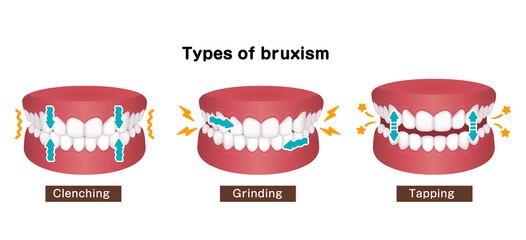What is Bruxism?
Causes of Bruxism: Bruxism can be caused by various factors, including stress, anxiety, misaligned teeth, poor sleep patterns and disorders, and lifestyle habits. Stressful situations or unresolved tension often manifest during sleep as grinding and clenching of the teeth, leading to bruxism.
Effects of Bruxism: While occasional teeth grinding may not cause significant harm, chronic bruxism can result in several adverse effects. These include worn tooth enamel and damage, broken crowns, inlays, fillings, tooth sensitivity, jaw pain, headaches, facial muscle discomfort, and even temporomandibular joint (TMJ) disorders such as Temporomandibular joint dysfunction (TMD). Over time, untreated bruxism can lead to severe dental complications, such as fractures, tooth loss, and gum recession.

- Stress Management: Techniques such as meditation, pilates, mindfulness, yoga, deep breathing exercises, and counselling can help reduce stress and anxiety levels, thereby minimizing teeth grinding triggered by emotional factors.
- Bespoke Nightguards: Dentists may recommend wearing custom-fitted nightguards or splints during sleep to protect the teeth from the damaging effects of bruxism. These appliances provide a cushioning barrier between the upper and lower teeth, preventing wear and tear.
- Behavioural Therapy: Cognitive-behavioural therapy (CBT) can be beneficial for individuals whose bruxism is linked to stress or anxiety. This therapy aims to modify harmful behaviours and teach relaxation techniques to prevent teeth grinding and clenching.
- Dental Correction: In cases where misaligned teeth contribute to bruxism, orthodontic treatments or dental restorations may be recommended to improve the alignment of the teeth and alleviate pressure on the jaw joints.
- Medication: In some instances, muscle relaxants or anti-anxiety medications may be prescribed to manage bruxism symptoms, particularly when stress and anxiety are significant contributing factors.
In conclusion, bruxism is a common dental condition that can have detrimental effects on oral health and overall well-being if left untreated. By understanding its causes, recognizing its effects, and seeking appropriate treatment, individuals can effectively manage bruxism and preserve their dental health for the long term. If you suspect that you or a loved one may be suffering from bruxism, consult with a qualified dentist for a comprehensive evaluation and personalized treatment plan

Notting Hill Branch – 020 7229 4813
Shepherds Bush Branch – 020 8743 4065
Heston Branch – 020 8570 0435
Fill in your Smile evaluation form and book a cosmetic consultation at one of our practices
https://ghauridentalcentre.com/smile-evaluation/
1) Book today for a smile evaluation
2) Fill in your Smile evaluation form
3) Discuss your Smile Makeover requirements
4) Book for dental check-up, dental hygiene

